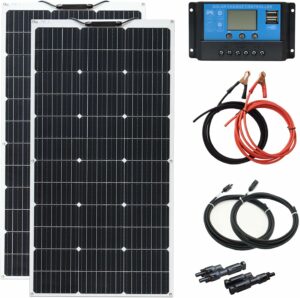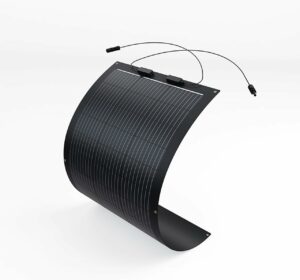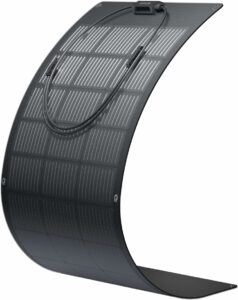The Benefits of Flexible Solar Panels
Introduction
Flexible solar panels, also known as thin-film solar cells, represent a revolutionary advancement in solar technology.
Unlike traditional rigid solar panels, these panels are crafted from flexible materials, allowing them to conform to various surfaces.
The core principle remains the same — converting sunlight into electricity — but the design flexibility opens up many possibilities for their application.
In essence, flexible solar panels are composed of thin layers of photovoltaic materials, often deposited on flexible substrates like plastic.
This departure from the bulkier, rigid structures of conventional solar panels brings many advantages, ranging from enhanced portability to increased versatility in deployment.
Provo Green Products embodies a beacon of trust in sustainable discoveries, offering choices that enhance your life and leave a positive mark on our planet.
Leveraging extensive expertise in manufacturing, construction, and various trades, we provide a solid foundation for sustainable living.
Our meticulous research process guarantees that our information about each product is precise and current, allowing you to make informed decisions.
Whether your interest lies in solar products, electric bikes, or other eco-friendly alternatives, our commitment to credibility ensures you have access to dependable insights, guiding your journey toward a more sustainable lifestyle.
Provo Green Products is your go-to destination for finding the right green products for your lifestyle.
Disclosure: As an Amazon Associate, we may earn from qualifying purchases. This does not affect the product pricing whatsoever.
Environmental Advantages
Reduced Carbon Footprint:
- One of the primary environmental benefits of flexible solar panels is their ability to significantly reduce carbon footprints associated with energy production.
- Unlike conventional energy sources that rely on fossil fuels, flexible solar panels generate electricity through a clean and renewable process.
- By harnessing energy from the sun, these panels contribute to substantially decreasing greenhouse gas emissions, helping combat climate change and minimizing the environmental impact of energy consumption.
Minimal Impact on Ecosystems:
- These solar panels’ lightweight and flexible nature offers a distinct advantage regarding ecosystem impact. Traditional solar installations often require substantial land use and can disrupt natural habitats.
- In contrast, flexible solar panels can be integrated into existing structures, such as building facades or clothing, minimizing the need for additional land and reducing ecosystem disturbances.
- This adaptability ensures that the deployment of solar energy remains harmonious with the surrounding environment.
End-of-life Considerations:
- Addressing the environmental impact continues beyond the energy generation phase. Flexible solar panels also demonstrate advantages in their end-of-life considerations.
- Many traditional solar panels use materials that can be challenging to recycle, leading to concerns about electronic waste. On the other hand, flexible solar panels often use more readily recyclable materials.
- This emphasizes a commitment to a sustainable lifecycle, ensuring that the environmental benefits extend beyond electricity generation.
In summary, the environmental advantages of flexible solar panels are multi-faceted.
They reduce reliance on fossil fuels, curb greenhouse gas emissions, and offer a more ecologically sensitive approach to energy production, considering land use and recyclability factors.
These advantages position flexible solar panels as a key player in fostering a cleaner, more sustainable energy future.
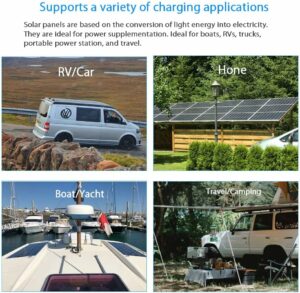
Versatility and Adaptability
Applications in Various Settings:
- Flexible solar panels showcase unparalleled versatility in their applications. Their adaptable nature allows integration into various settings, ranging from urban environments to remote and challenging landscapes.
- They can be seamlessly incorporated into existing infrastructures, such as building facades, roofs, or even windows, providing a dual purpose of energy generation and functional design.
- Moreover, their flexibility makes them suitable for unconventional locations, including curved surfaces and irregular structures, expanding the possibilities for solar energy utilization.
Integration into Different Surfaces:
- Unlike rigid solar panels that often require a dedicated framework or specific mounting structures, flexible solar panels can integrate directly into various surfaces.
- This integration capability simplifies installation processes and reduces the need for additional support structures, making them more versatile in deployment.
- Whether integrated into clothing fabrics, backpacks, or flexible solar blankets, these panels can harness solar energy innovatively, catering to diverse needs and preferences.
Portable and Lightweight Design:
- The lightweight design of flexible solar panels enhances their portability, making them ideal for mobile applications.
- From camping trips to remote expeditions, these panels can be easily folded or rolled, allowing users to carry a portable and efficient power source wherever they go.
- This portability is especially valuable when traditional power sources are impractical or unavailable, showcasing the adaptability of flexible solar panels in addressing diverse energy needs.
- The versatility and adaptability of flexible solar panels redefine the possibilities of solar energy utilization. Their ability to integrate into various settings and surfaces, combined with a portable design, opens up new avenues for renewable energy applications.
- This adaptability enhances their practicality and contributes to the democratization of solar energy, making it more accessible and applicable across different lifestyles and environments.
Cost-Efficiency and Economic Benefits
Lower Installation Costs:
- Flexible solar panels bring about significant cost-efficiency, primarily through lower installation expenses. The design flexibility allows for easier and more seamless integration into various structures, reducing the need for custom mounting solutions.
- This adaptability simplifies the installation process and reduces the costs of specialized labor and materials.
- As a result, the overall cost of installing flexible solar panels is often lower than traditional rigid panels, making them an economically attractive option for many applications.
Potential Savings for Consumers:
- The cost-efficiency of flexible solar panels extends beyond the installation phase to benefit end-users. As manufacturing processes evolve and economies of scale come into play, the cost of producing these panels decreases.
- This reduction in manufacturing costs translates to potential savings for consumers interested in adopting solar energy solutions for their homes, businesses, or personal devices.
- The affordability of flexible solar panels makes renewable energy more accessible, contributing to the broader adoption of sustainable practices.
Economic Stimulus through Industry Growth:
- The adoption of flexible solar panels not only benefits individual consumers but also stimulates economic growth on a larger scale. The renewable energy sector, including producing and deploying flexible solar panels, drives job creation and innovation.
- As the industry expands, it fosters the development of new technologies, research initiatives, and skilled job opportunities.
- This economic stimulus is not confined to the energy sector alone. Still, it has a ripple effect, positively influencing related industries and contributing to the overall economic well-being of communities and nations.
In summary, flexible solar panels’ cost-efficiency and economic benefits extend from lower installation costs to potential savings for end-users and the broader economic stimulus resulting from industry growth.
These factors contribute to the overall attractiveness of flexible solar panels as a sustainable and economically viable solution for individuals and society.
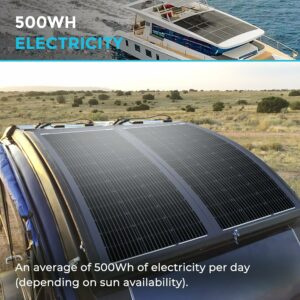
Technological Innovations and Advancements
Emerging Technologies in Flexible Solar Panels:
- The field of flexible solar panels is dynamic, with ongoing research and development leading to the emergence of cutting-edge technologies. Innovations in materials science, nanotechnology, and manufacturing processes continue to enhance the efficiency and durability of flexible solar panels.
- For instance, developing organic photovoltaic materials and perovskite solar cells represents breakthroughs that promise higher energy conversion efficiencies, pushing the boundaries of what flexible solar panels can achieve.
Increased Energy Conversion Efficiency:
- Improving the energy conversion efficiency of flexible solar panels is a crucial focus of technological advancements. Higher efficiency means that a more significant percentage of sunlight can be converted into electricity, maximizing the energy yield of these panels.
- Researchers are exploring novel materials and design approaches to optimize light absorption, electron mobility, and other factors influencing conversion efficiency.
- As a result, the latest generations of flexible solar panels are becoming more competitive with traditional rigid panels in terms of overall performance.
Role in Advancing Renewable Energy Solutions:
- Flexible solar panels are crucial in advancing the broader landscape of renewable energy solutions. Their unique characteristics, flexibility, and lightweight design make them suitable for applications beyond traditional solar installations.
- For example, they can be integrated into wearable technology, bright fabrics, and other innovative products.
- This diversification of applications not only expands the reach of solar energy but contributes to integrating renewable sources into everyday life, fostering a more sustainable and energy-efficient future.
- The constant evolution of technological innovations in flexible solar panels underscores their potential as a transformative force in the renewable energy sector.
As advancements continue to address challenges and push the boundaries of what is possible, flexible solar panels are poised to play a central role in shaping the future of clean and sustainable energy.
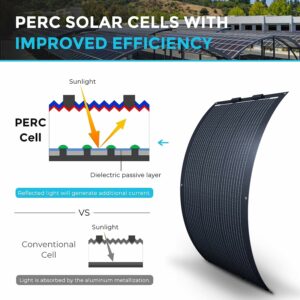
Conclusion
The benefits of flexible solar panels are multifaceted, ranging from their positive environmental impact to their economic advantages.
The adaptability and versatility of these panels redefine how we harness solar energy, enabling integration into diverse settings and surfaces.
Their cost-efficiency and potential consumer savings position flexible solar panels as a compelling choice for sustainable energy solutions.
Moreover, ongoing technological innovations promise to enhance efficiency and broaden applications, solidifying their role in advancing renewable energy solutions.
Stay in Touch!
I’am a dedicated entrepreneur with many years of experience and an integrity-driven individual who is highly motivated to succeed. Leveraging extensive expertise in manufacturing, construction, and various trades, we can provide a solid foundation for sustainable living. Our meticulous research process guarantees that our information about each product is precise and current, allowing you to make informed decisions. A deep understanding of business operations empowers me to consistently implement improvements that result in ongoing success. Visit site.

